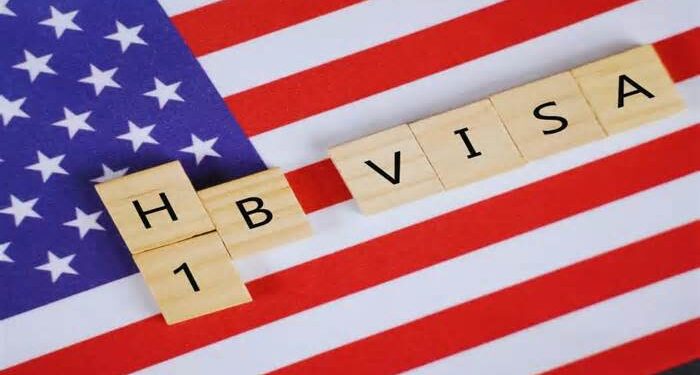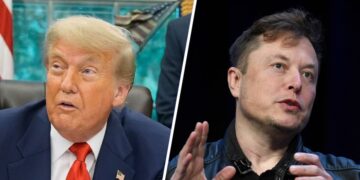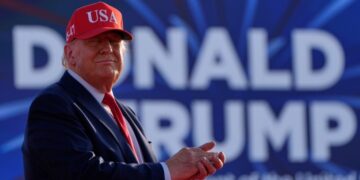
The Trump administration has unveiled a new proposal to significantly overhaul the H-1B visa program, introducing wage-based selection criteria instead of the traditional lottery system. The move, announced by the U.S. Department of Homeland Security (DHS) on Tuesday, comes just days after President Donald Trump imposed a $100,000 annual fee on new H-1B Visa applications.
The proposed rule aims to “protect American workers” by prioritizing higher-paid and highly skilled foreign professionals, a shift that could profoundly reshape the U.S. labor market and global talent mobility.
From Lottery to Wage-Based Selection
Until now, the H-1B visa lottery system randomly selected candidates from a pool of applicants. Under the new proposal, however, the selection process would be weighted by wage levels. Workers in the highest of the four wage categories could receive up to four entries in the selection pool, while those in the lowest tier would be entered only once.
This means that an engineer earning $160,000 at a large corporation like Meta or Google may have four times the odds of securing a visa compared to a junior developer at a startup earning $70,000. According to DHS officials, this rule will discourage companies from relying on low-wage foreign workers and instead attract top-tier talent that contributes more to the U.S. economy.
Economic and Business Impact
While the administration argues the changes are designed to protect American wages, critics warn that the rule could heavily impact startups and smaller businesses. The DHS itself estimated that about 5,200 small businesses relying on the H-1B Visa program could face significant economic challenges due to reduced access to affordable foreign talent.
Immigration attorney Nicole Gunara explained that the proposal “tilts the system toward established companies who can pay higher salaries, while limiting opportunities for emerging firms that depend on younger, early-career international workers.”
Industry experts believe the regulation, if finalized, could also lead to higher costs for U.S. employers. According to DHS estimates, wages paid to H-1B Visa workers could rise by $502 million in 2026, eventually increasing by $2 billion annually between 2029 and 2035.
Heavy Reliance of Indian IT Firms
Indian professionals remain the largest beneficiaries of the H-1B program, accounting for 71% of all approved visas in recent years. Companies such as Infosys, TCS, and Wipro heavily depend on H-1B visa to place skilled workers in the United States.
The combination of the new $100,000 visa fee and the wage-based selection system could cost Indian IT giants billions of dollars and may force them to reduce hiring or shift more jobs back to India.
Political Context and Reactions
The proposed H-1B Visa reforms align with President Trump’s “America First” agenda. In announcing the policy, the White House stated that the measure would “discourage companies from spamming the system and driving down wages,” while ensuring that high-paying U.S. businesses can still access global talent.
President Trump, signing the earlier proclamation, reiterated his stance: “The incentive is to hire American workers.”
However, critics argue the reforms are politically motivated ahead of the U.S. elections. Immigration advocates caution that the new system risks sidelining young graduates and early-career professionals who are vital for innovation and entrepreneurship.
Global and Diplomatic Implications
The timing of the proposal coincides with high-level diplomatic visits to the U.S. by India’s External Affairs Minister S. Jaishankar and Commerce Minister Piyush Goyal. Indian officials are expected to raise concerns, given that thousands of Indian workers and companies could be disproportionately affected.
Moreover, the rule could alter the global flow of talent. If the United States prioritizes only higher-paid workers, countries like Canada and the UK may benefit from attracting younger, entry-level international professionals seeking opportunities abroad.
What’s Next?
The regulation is not yet final. The DHS has opened a 30-day public comment period, after which the rule could take months—or even years—to be fully implemented. If finalized, the new system may be in place before the 2026 H-1B registration period.
This is not the first attempt to reform the H-1B Visa lottery. A similar wage-based regulation proposed in 2020 was blocked in federal court and later withdrawn by the Biden administration. With Trump now returning to the presidency, the administration appears determined to push the reform through.
As the debate intensifies, the future of thousands of skilled foreign workers—and the U.S. companies that depend on them—hangs in the balance.
















